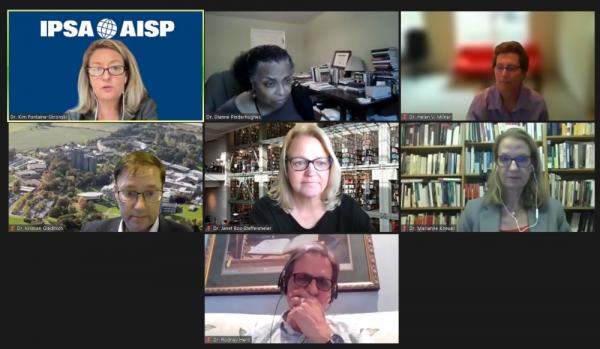

IPSA, APSA and ISA Gather to Discuss Collaboration Efforts
Publication date: Tue, 28 Sep 2021
Current and former presidents of IPSA, APSA and ISA gathered for IPSA’s Pre-APSA Annual Meeting workshop on 27 September 2021, entitled “The Importance of Developing Ties between Political Science Associations.” IPSA President Dianne Pinderhughes chaired the online workshop, with the participation of five prominent scholars.
The workshop began with opening remarks by IPSA Executive Director Kim Fontaine-Skronski, who welcomed the participants and introduced the guest speakers. Dr. Fontaine-Skronski then introduced IPSA President Dianne Pinderhughes, who delivered the welcome address.
Dr. Pinderhughes explained the idea behind the workshop, which was to look back on the close ties fostered between IPSA and APSA over the years, by identifying successful projects and collaborations as well as challenges. She touched on her commitments as President of IPSA, including on the Association’s Strategic Plan (2018-2022), the importance of increasing representation from the Global South, and her career-long interest in racial and ethnic political and social integration. Finally, she announced the signing of the first Memorandum of Understanding (MoU) between IPSA and ISA. The MoU established an official bilateral agreement between the two associations, allowing them to further their existing collaboration on several fronts.
ISA President Kristian Skrede Gleditsch also offered his comments on the newly signed MoU. Dr. Gleditsch pointed out that it’s a great value for ISA to have close ties with IPSA, as it would promote further collaboration between the two organizations.
Dr. Pinderhughes then introduced the workshop’s first presenter, APSA President Janet Box-Steffensmeier. Ms. Box-Steffensmeier emphasized engaged pluralism through active interaction, debate and learning, also discussing what social sciences and political science have to offer in solving important public policy problems. According to Ms. Box-Steffensmeier, solutions to many of the world’s challenges lie in technical and engineered aspects, which are increasingly well understood. By better connecting technical solutions to political, social-economic and behavioural environments, we can thus better solve the challenges that lie ahead.
The next presenter, ISA President Kristian Skrede Gleditsch, presented an overview of ISA’s academic activities and the association’s efforts to collaborate with other organizations. As the world’s largest association dedicated to international studies, ISA has more than 7,000 members and collaborates with 100 partner organizations.
Former IPSA Vice-President and former APSA President Rodney Hero was the next speaker. Dr. Hero highlighted “learning” and “support” in the context of collaboration among associations. He emphasized that overlapping networks and links between individuals and associations, together with activities such as this workshop, can be used to formalize and institutionalize collaboration for future learning and intellectual growth.
IPSA Past President Marianne Kneuer emphasized IPSA’s unique structure and its close relationship and collaboration with collective members (61 national associations) worldwide. Prof. Dr. Kneuer then cited some of the challenges faced by the political science community, including academic freedom, scientific integrity, and issues raised by digitalization. She went on to explain that it makes no sense for associations to deal with these issues on their own, highlighting the need to coordinate, share experiences, best practices and models, and sustain a permanent dialogue. She also discussed the IPSA Academic Freedom Report 2021. Written by Prof. Dr. Kneuer, the report stems from a survey conducted among 44 national and regional political science association members of IPSA between 2020 and 2021.
Finally, former IPSA and ISA President Helen V. Milner reiterated that associations deal with similar issues, centred mainly around academic freedom and freedom of speech, and that they have common interests and goals, such as sharing new ideas, knowledge and methods. Dr. Milner also spoke about the challenges young scholars face, including the scarcity of new positions and research funding, lengthy review processes, and the difficulties inherent in publishing.
The event concluded with a Q&A session with the audience.
Please click here to watch the video of the workshop.











